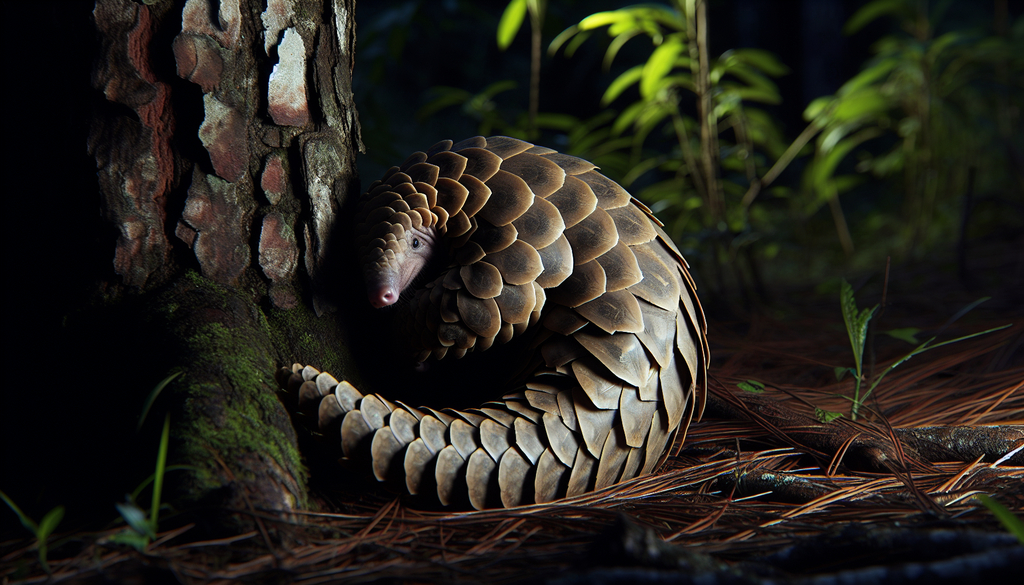African pangolins targeted more for their meat than illegal scale trade – with flesh deemed most delicious

Image:
A white-bellied pangolin perched on a tree branch in Nigeria.
Photo credit: Alex Moore
• A recent study reveals that local consumption of bushmeat, not the international trade in pangolin scales for traditional medicine, is the primary driver of illegal pangolin hunting in West Africa.
• Extensive interviews with hunters indicate pangolins are mostly hunted for food, with most of their scales discarded. Local surveys suggest pangolin meat is considered the most delicious option among bushmeats.
A new investigation led by the University of Cambridge indicates that in the forests of West Africa, pangolins are hunted overwhelmingly for their meat rather than for the trade of their scales in Asian markets.
Pangolins, elusive insectivores about the size of a large housecat*, are the most trafficked wild mammal globally. Their distinctive keratin scales are highly sought after in traditional Chinese medicine.
All eight species of pangolin are endangered and listed on the IUCN Red List, with three Asian species considered critically endangered.
As populations of Asian pangolins have plummeted, Nigeria has emerged as a major exporter of their scales to Asia. Despite protective laws, Nigeria now serves as a key trafficking hub for pangolin-derived products.
However, findings recently published in the journal Nature Ecology & Evolution suggest that nearly all pangolins in Nigeria—98%—are targeted primarily for their meat. Two-thirds of the scales from these hunts are reportedly discarded.
Researchers from Cambridge gathered responses from more than 800 hunters and traders across 33 locations in the Cross River Forests of Nigeria between 2020 and 2023. They estimate that nearly 21,000 pangolins are killed each year in this region alone.
Almost all hunters (97%) reported capturing pangolins incidentally during general hunting activities, not by actively seeking them. The vast majority (98%) were taken for their meat. About 71% were eaten by the hunters themselves, and 27% were sold as food locally.
Surprisingly, despite the high value of scales on the global black market, nearly 70% of them were discarded. Only a minority (about 30%) found their way into trade. According to researchers, local markets pay three to four times more for pangolin meat than the scales.
“Large-scale seizures at Nigeria’s ports suggest a focus on the international scales trade, but our fieldwork revealed that bushmeat is the real driver behind the killing of pangolins,” said lead author Dr Charles Emogor, a Gates Cambridge Scholar who carried out the research as part of his PhD at Cambridge’s Department of Zoology.
“Most pangolin captures are not intentional,” Emogor explained. “They happen when hunters are out hunting other animals.” Emogor, now a Schmidt Science Fellow, divides his work between Cambridge and Harvard Universities.
“A significant number of pangolins are picked up while people are farming or moving through the forest. Pangolins naturally curl into a ball when threatened, making them easy to snatch by hand,” Emogor added.
Although the international demand for scales is accelerating pangolin losses—Emogor’s previous studies show Nigerian authorities intercepted shipments totaling over 190,000 kilograms of pangolin scales from 2010 to 2021—the species has long been hunted for food in West Africa.
In some Nigerian communities, pangolin meat is considered a special delicacy, sometimes reserved for pregnant women who believe it helps produce strong, healthy babies. During their research, Emogor and his team surveyed local populations on the taste quality—referred to as "palatability"—of nearly 100 species of bushmeat consumed in the area, ranging from chicken and beef to antelope and monkey.
The three main African pangolin species consistently ranked as the tastiest meats, each scoring close to nine out of ten on the palatability scale. The giant pangolin topped the list.
“These animals are facing critical threats from multiple fronts,” Emogor explained. “They’re easy to catch, reproduce slowly, are highly favored as meat, are wrongly believed to have healing properties, and their forest habitats are declining.”
Motivated by these findings, Emogor founded the organization Pangolino in 2021. The group, composed of conservationists, scientists, and volunteers, works globally to protect pangolins. Emogor emphasizes that tackling the issue at the source—local meat hunting—may be more cost-effective than focusing solely on disrupting the international scales trade.
He recommends a mix of anti-poaching initiatives and community-driven food security strategies. Through Pangolino, pilot programs have been launched in four southeastern Nigerian villages, supporting local bylaws banning pangolin hunting and offering financial rewards for community compliance.
“To create effective conservation policies, we have to understand why hunters do what they do,” said study co-author Professor Andrew Balmford of Cambridge’s Department of Zoology. “Research like this gives us the insight needed to build practical solutions.”
Though focused on Nigeria, the study’s findings parallel pangolin hunting and consumption trends seen in Cameroon and Gabon, suggesting a continent-wide pattern.
Growing up near Cross River National Park—home to Nigeria’s white- and black-bellied pangolins—Emogor says he only saw lifeless pangolins as a child and didn’t encounter a live one until adulthood.
"Losing pangolins would mean losing 80 million years of natural history,” said Emogor. “They are unique among mammals for having scales, and their lineage dates back to when dinosaurs still roamed Earth.”
The study was conducted by a partnership of institutions, including the University of Cambridge, Wildlife Conservation Society, Pangolin Protection Network, University of Washington, CIFOR, CARE International, and UK universities Oxford, Exeter, and Kent.
Notes:
*While white-bellied pangolins are about the size of a domestic cat, giant pangolins can grow to a weight of up to 30 kilograms.
Journal
Nature Ecology & Evolution
DOI
10.1038/s41559-025-02734-3
Article Title
Pangolin hunting in southeast Nigeria is motivated more by local meat consumption than international demand for scales
Article Publication Date
13-Jun-2025

